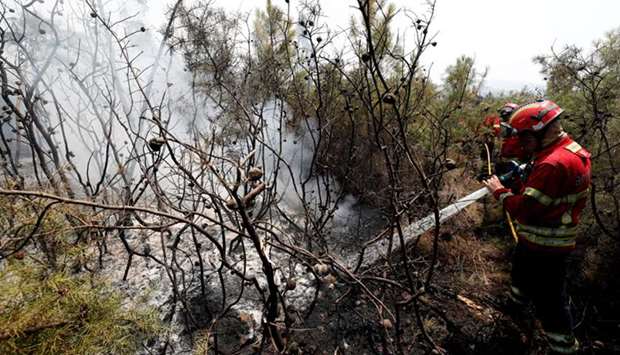Planes and helicopters joined nearly 2,000 firefighters in central Portugal yesterday to battle huge wildfires in a mountainous region where more than 100 people died in huge blazes in 2017.
Some 1,700 firefighters and 400 vehicles were deployed in one of the biggest mobilisations ever seen in the area to fight the blazes in the heavily forested Castelo Branco region, 200km north of Lisbon, the rescue services said.
Around 20 people have been injured in the blaze, including eight firefighters and 12 civilians, according to the interior ministry.
One badly-burned civilian was evacuated by helicopter to Lisbon.
The biggest effort – 800 firefighters, 245 vehicles and 13 planes and helicopters – battled to douse flames in the municipality of Vila de Rei.
That fire “remains active”, Interior Minister Eduardo Cabrita told journalists.
As flames closed in on the villages yesterday afternoon, locals were forced to take matters into their own hands, protecting their homes from huge wildfires with buckets of water and hosepipes as strong winds fanned the blaze.
Having spread to the nearby Santarem district, they are now threatening several villages in the Vila de Rei and Macao municipalities.
Meanwhile, police said a 55-year-old man had been arrested in Castelo Branco suspected of setting a fire on the outskirts of the town, though this one was far from the main infernos.
Authorities are looking into whether the fires may have been started deliberately, Cabrita said.
“The cause of the fires is being investigated ... there’s something strange. How is it that five such large fires broke out in areas that are so close to each other?” he asked.
The region’s Civil Protection chief, Luis Belo Costa, said that “given the difficult terrain, we have not succeeded in getting the fire in Vila de Rei under control, but have only contained about 60% of it, despite a lull in the wind”.
The army said it was dispatching 20 soldiers and machinery to open routes “to facilitate access” for the firefighters.
In a message, President Marcelo Rebelo de Sousa expressed his “solidarity with the hundreds fighting the scourge of the fires”.
He cancelled all appointments over the weekend.
The presidential office said de Sousa was closely following the efforts to control the blaze.
Two other forest fires reported on Saturday have since been brought under control.
While a number of small villages were evacuated as a precaution overnight, no additional measures were planned.
However, that could change “if the situation deteriorates”, Belo Costa said.
Five regions of central and southern Portugal were on maximum fire alert yesterday because of the dry weather and winds.
However, temperatures are currently below the threshold of 41° Celsius (105° Fahrenheit), at which a red alert is triggered.
The fires, fanned by strong winds, broke out on Saturday afternoon in the more inaccessible areas in the Castelo Branco region.
The centre of Portugal is hilly and covered in dense forest and is regularly ravaged by fires, including the deadliest in the country’s history when more than 110 people perished in two separate blazes in June and October 2017.
“The fire is out of control, without resources on the ground, and the population at risk,” Vasco Estrela, the mayor of Macao, told Portuguese radio station TSF. “We never thought we would live through this again.”
Much of the population in the area is elderly, as young people move to the cities.
The forests are largely eucalyptus, a highly flammable wood used in the paper industry.
Despite the combustion risks, the trees are planted because they are fast-growing and a major source of income for locals.
With fields and pastures abandoned, the forests are poorly maintained, and the dense undergrowth facilitates the spread of the fires.
According to the EU’s European Forest Fire Information System, more than 250,000 hectares (620,000 acres) of land was destroyed by fire across Europe between January and April this year, compared with 181,000 hectares recorded for the entire fire season in 2018.

Firefighters put out a forest fire near the village of Vila de Rei.
